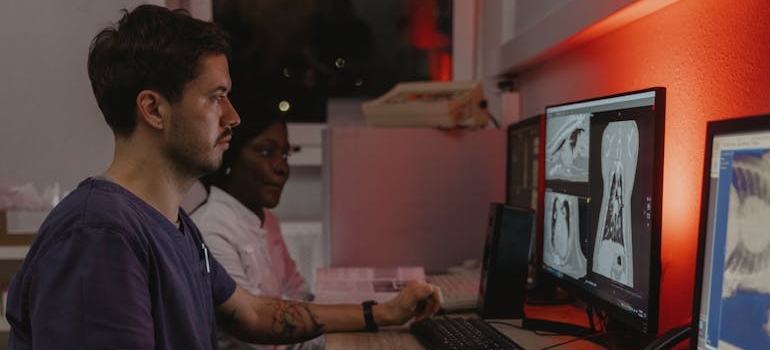Ensuring Data Security and HIPAA Compliance During Healthcare Moves
Get a QuoteRelocating healthcare facilities isn’t just about transporting equipment and personnel. It involves a highly sensitive process of moving patient records, medical histories, and other confidential information. Ensuring data security and HIPAA compliance during healthcare moves is a must to maintain patient confidentiality and avoid legal complications. Without a solid plan, a healthcare move could expose private health information, leading to severe legal and financial consequences. This article will explore the steps healthcare providers must take to protect sensitive information during relocations.
Understanding HIPAA Regulations for Relocation
Before we get into the nitty-gritty of securing data during a healthcare move, let’s discuss HIPAA and why it’s so important. HIPAA is a federal law that mandates the protection of patient health information (PHI), including everything from a patient’s medical history and treatments to their personal identification information.
The law is designed to ensure that healthcare providers take every possible step to secure PHI, and this responsibility doesn’t take a backseat during a move. In fact, a healthcare facility’s responsibility to protect patient data only increases during relocation chaos. Whether it’s paper files, digital records, or even conversations overheard by staff, all forms of PHI must be kept secure throughout the process.

Conducting a Pre-Move Risk Assessment and Compliance Planning
The first step in ensuring HIPAA compliance during a healthcare move is conducting a thorough risk assessment. This involves identifying potential risks to PHI during the move and planning how to mitigate them.
Here are some questions to ask during this assessment:
- How will patient data, both physical and digital, be handled during the move?
- Who will have access to this data throughout the process?
- What security measures are currently in place, and how can they be adapted for the move?
- Is there a plan for the safe disposal of outdated or unnecessary records?
Answering these questions will help you develop a detailed plan for securing PHI during the move. Remember, this isn’t just about protecting data from external threats; it’s also about ensuring that internal access is appropriately controlled.
Secure Data Handling Procedures
Regarding physical records, you need to establish strict protocols for handling and transporting these documents. The best way to do this is by limiting access to only essential personnel. Every file should be accounted for, and it’s crucial to use tamper-proof containers to transport sensitive documents. Labeling and categorizing files is another smart move to ensure nothing gets lost in the shuffle.
Data encryption is your best friend for digital records. All digital data should be encrypted before the move, and access should be restricted to authorized personnel. Additionally, any digital devices such as computers, servers, and hard drives should be secured with password protection and, if possible, multi-factor authentication.

Partnering with a HIPAA-Compliant Moving Company
Selecting the right moving company is a top priority when relocating healthcare facilities, as not all movers are familiar with HIPAA regulations. Interstate Logistics specializes in HIPAA-compliant moves, successfully assisting many hospitals with relocations. Our team understands the complexities of transporting sensitive healthcare data and equipment while ensuring compliance with data protection laws.
Protecting Digital Systems and Networks
Much of the sensitive information you handle is stored digitally. That’s why securing your digital systems and networks during a move is necessary. One of the most significant risks during a move is the possibility of data breaches caused by improper handling of servers, computers, and other hardware.
Before the move, ensure all systems are backed up to a secure location. This ensures that the data will not be lost if any devices are lost or damaged during the move. For added security, consider using cloud storage for temporary backup and planning for data migration to safely transfer digital information from old systems to new ones at the new location.
Data migration ensures that all digital records, patient data, and software applications are securely transferred to updated systems without disruption. This process helps minimize the risk of data corruption or loss during the move while also keeping systems fully functional.
You should also assess your network security before, during, and after the move. Ensure your IT team is involved in the planning process, and consider implementing additional layers of security, such as firewalls or VPNs, to protect your data as your systems are reconnected in the new location.

Conduct a Post-Move Audit
After the move is complete, the work isn’t over. Conduct a post-move audit to ensure that all patient data remained secure and that no PHI was compromised. This involves reviewing your physical and digital records inventory, checking your new systems for potential vulnerabilities, and verifying that all access controls are correctly in place.
Additionally, take some time to debrief with your team and the moving company. Discuss what went well and where there might be room for improvement. This will help you refine your processes for any future moves and ensure that your data security protocols continue to evolve.
Protecting Sensitive Information: Data Security and HIPAA Compliance During Healthcare Moves
Data security and HIPAA compliance during healthcare moves are vital for protecting sensitive patient information and maintaining legal compliance. By understanding HIPAA regulations, performing a thorough pre-move risk assessment, selecting a HIPAA-compliant moving company, and securing data throughout the move, healthcare providers can safely relocate without compromising patient confidentiality. Following these steps ensures that data security is maintained from start to finish, reducing the risk of breaches and safeguarding healthcare operations.
